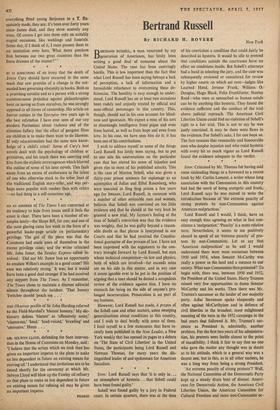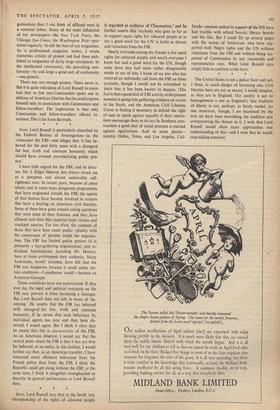Bertrand Russell
DIERTRAND RUSSELL, a man venerated by my generation of Americans, has lately been writing a good deal of nonsense about the United States. The tone has been unerringly hostile. This is less important than the fact that what Lord Russell has been saying betrays a lack of perception, a lack of information and a formidable reluctance to overcoming these de- ficiencies. The hostility is easy enough to under- stand; Lord Russell has on at least two occasions been rudely and unjustly treated by official and semi-official personages in this country. This, though, should not in his case account for blind- ness and ignoranCe. We expect a man of his sort to disentangle intelligence from pique and even from hatred, as well as from hope and even from love. In his case, we have seen him do it; it has been one of his contributions.
I wish to address myself to some of the things Lord Russell has lately been saying, but to put to one side his asseverations on the particular case that has stirred his sense of injustice and given rise to most of his published attacks. This is the case of Morton Sobell, who was given a thirty-year prison sentence for espionage as an accomplice of Julius and Ethel Rosenberg, who were executed in Sing Sing prison a few years ago for treason. Lord Russell, in common with a number of other estimable men and women, believes that Sobell was convicted on too little evidence and that he should at the very least be granted a new trial. My layman's feeling at the time of Sobell's conviction was that the evidence was weighty, that he was guilty beyond a reason- able doubt as that phrase is interpreted in our Courts and that he had received the Constitu- tional guarantee of due process of law. I have not been impressed with the arguments to the con- trary brought forward by Lord Russell, but men whose technical competence—in law and physics, both of which are involved—far exceeds mine are on his side in this matter, and in any case it seems ignoble ever to be put in the position of arguing that a man should be denied a scrupulous review of the evidence against him. I have no stomach for being on the side of anyone's pro- longed incarceration. Prosecution is no part of my business. However, Lord Russell has made, a propos of the Sobell case and other matters, some sweeping generalisations about conditions in this country, and 1 wish to deal briefly with some of them. I limit myself to a few statements that have re- cently been published in the New Leader, a New York weekly that has opened its pages to a debate on 'The State of Civil Liberties' in the United States, the participants being Lord Russell and Norman Thomas, for many years the dis- tinguished leader of and spokesman for American Socialism.
Item: Lord Russell says that 'it is only in ... an atmosphere of hysteria ... that Sobell could have been found guilty.'
Sobell was found guilty by a jury in Federal court. In certain quarters, there was at the time of his conviction a condition that could fairly be described as hysteria. It would be idle to pretend that conditions outside the courtroom have no effect on conditions inside. But Sobell's attorneys had a hand in selecting the jury, and the case was subsequently reviewed or considered for review by higher courts on which sat men—judges like Learned Hand, Jerome Frank, William 0. Douglas, Hugo Black, Felix Frankfurter, Stanley Reed—who were as untouched as human minds can be by anything like hysteria. They found the evidence sufficient and the conduct of the trial above judicial reproach. The American Civil Liberties Union could find no violation of Sobell's right to a fair trial. This is not to say he was justly convicted. It may be there were flaws in the evidence. For Sobell's sake, I for one hope so. The fact remains that reasonable and honourable men who despise injustice and who resist hysteria with every bit as much vigour as Lord Russell found the evidence adequate to the verdict.
Item: Criticised by Mr. Thomas for having said some misleading things in a foreword to a recent book by Mr. Corliss Lamont, a writer whose long association with the Communists in this country had had the merit of being energetic and frank, Lord Russell says he was moved to write the introduction because of 'the extreme paucity of strong protests by non-Communists against American malpractices.'
Lord Russell and I would, I think, have an easy enough time agreeing on what in fact con- stitutes a `malpractice.' Paucity' is a more relative term. Nevertheless, it seems to me positively absurd to speak of an 'extreme paucity' of pro- tests by non-Communists. Let us say that 'American malpractices' as he and I would understand them were most numerous between 1950 and 1954, when Senator McCarthy was really a power in the land and a menace to our society. What non-Communists then protested? To begin with, there was, between 1950 and 1952, the President of the United States. Harry Truman missed very few opportunities to damn Senator McCarthy and his works. Then there was Mr. Truman's successor as the leader of our majority party. Adlai Stevenson spoke eloquently and often against McCarthyism and in defence of civil liberties in the broadest, most enlightened meaning of the term in the 1952 campaign in the bad years that followed it. Mr. Truman's suc- cessor as President is, admittedly, another problem. For the first two years of his administra- tion, his protests were feeble almost to the point of inaudibility. I think it fair to say that no one who gave the matter any thought was in doubt as to his attitude, which in a general way was a decent one, but in this, as in all other matters, he was a long way from being a strong President.
'An extreme paucity of strong protests'? Well, the National Committee of the Democratic Party kept up a steady drum beat of dissent. Ameri- cans for Democratic Action, the American Civil Liberties Union, the American Committee for Cultural Freedom and more non-Communist or- ganisations than I can think of offhand were in a constant lather. Many of the most influential of our newspapers—the New York Times, the Chicago. Sun-Times, the Washington Post—pro- tested regularly. So did the best of our magazines. As a professional magazine writer, I wrote . numerous articles of proteit and had them pub- lished in magazines of fairly large circulation. In the intellectual community, the prevailing con- formity—by and large a good sort of conformity —was protest.
There was not enough protest. There never is. But it is quite ridiculous of Lord Russell to main- tain that so few non-Communists spoke out in defence of American liberties that he could express himself only in association with Communists and fellow-travellers. The implication is that only Communists and fellow-travellers offered re- sistance. This is far from the truth.
* * *
Item: Lord Russell is particularly disturbed by the Federal Bureau of Investigation—in the vernacular the FBI—and alleges that 'it has be- haved for the past forty years with a disregard for law, truth and common humanity which should have aroused overwhelming public pro- test.
I have little regard for the FBI, and its direc- tor, Mr. J. Edgar Hoover, has always struck me as a pompous and almost unbearably self- righteous man. In recent years, because of some idiotic and in some ways dangerous programmes that have originated outside the FBI, the agents of that bureau have become involved in matters that have a bearing on American civil liberties. Some of them have gone around asking questions that were none .of their business, and they have allowed into their files material from vicious and crackpot sources. Far too often, the contents of those files have been made public—plainly with the connivance of persons inside the organisa- tion. The .FBI has limited police powers (it is primarily a fact-gathering organisation), and in- dividual functionaries, including Mr. Hoover, have at times overstepped their authority. Many Americans, myself included, have felt that the FBI was dangerous because it could under cer- tain conditions—I emphasise 'could'—become an American Gestapo.
Those conditions have not materialised. If they ever do, the legal and political restraints on the FBI may prevent it from becoming a Gestapo. But. Lord Russell does not talk in terms of 'be- coming.' He asserts that the FBI has behaved with disregard for law, truth and common humanity. If he means that such behaviour by individual agents has now and then been ob- served, I would agree. But I think it clear that he means that this is characteristic of the FBI. As an American observer, I would say that the• central point about the FBI is that it has not thus far behaved, as an entity, in this fashion. I would further say that, as an American traveller, I have witnessed more offensive behaviour from the French police than from the FBI. I think the Republic could get along Without the FBI; at the same time, I think it altogether wrongheaded to describe its general performance as Lord Russell does.
Item: Lord Russell says that in the South 'any championship of the rights of coloured people is regarded as evidence of COmmunism,' and he further asserts that 'anybody who goes so far as to support equal rights for coloured people or to say a good word for the UN' is liable to threats and visitations from the FBI.
Nearly everyone among my friends is for equal rights for coloured people, and nearly everyone I know has said a good word for the UN, though some have also had some rather disagreeable words to say of late. I know of no one who has received an unfriendly call from the FBI on these accounts, though I would not be astonished to learn that it has been known to happen. (The fact is that a good deal of FBI activity at the present moment is going into gathering evidence on racists in the South, and the American Civil Liberties Union is finding it necessary to defend the right of men to speak against equality if their convic- tions encourage them to do so.) In Southern com- munities a good deal of social pressure is exerted against egalitarians. And in some places— notably Dallas, Texas, and Los Angeles, Cali- fornia—persons ardent in support of the UN have had trouble with school boards, library boards and the like. But I could fill up several pages with the names of Americans who have sup- ported both Negro rights and the UN without visitations from the FBI and without being sus- pected of Communism by any reasonable and representative men. What - Lord Russell says simply fails to conform to the facts.
The United States is not a police State and not, I think, in much danger of becoming one. Civil liberties here are not as secure, I would imagine, as they are in England. Our society is not so homogeneous a one as England's. Our tradition of liberty is not, perhaps, as firmly rooted. As one American, though, I am heartened by the way we have been nourishing the tradition and overpowering the threats to it. I wish that Lord Russell would show some appreciation and understanding of this—and I wish that he would stop talking nonsense.













































 Previous page
Previous page